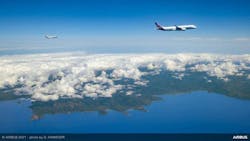First study of commercial aircraft running on 100% SAF show significant emissions reduction
BERLIN - Participants in the first-ever in-flight study of the impact of using 100% sustainable aviation fuel (SAF) on both engines of a commercial aircraft announced results show a reduction in soot particles and formation of contrail ice crystals compared to using conventional Jet A-1 fuel.
The ECLIF3 study, in which Airbus in Tolouse, France, Rolls-Royce in London, the German Aerospace Center (DLR) in Cologne, and SAF producer Neste in Espoo, Finland, collaborated, measured emissions from both engines of an Airbus A350 powered by Rolls-Royce Trent XWB engines and followed by a DLR chase plane.
Compared to a reference jet A-1 fuel, the number of contrail ice crystals per mass of unblended SAF consumed was reduced by 56%, which could reduce the climate-warming effect of contrails.
Related: Boeing, NASA, United Airlines to test sustainable aviation fuel benefits
Global climate model simulations conducted by DLR were used to estimate the change in the energy balance in Earth’s atmosphere - also known as radiative forcing - by contrails. The impact of contrails was estimated to be reduced by at least 26 percent with 100% SAF use compared to contrails resulting from the Jet A-1 reference fuel used in ECLIF3. These results show that using SAF in flight could reduce the climate impact of aviation in the short term by reducing non-CO2 effects such as contrails, in addition to reducing CO2 emissions over the lifecycle of SAF.
The research team has reported its findings in the Copernicus journal Atmospheric Chemistry & Physics (ACP) as part of a peer-reviewed scientific process and provides the first in-situ evidence of the climate impact mitigation potential of using pure, 100% SAF on a commercial aircraft. The ECLIF3 program, which also includes researchers from the National Research Council of Canada and the University of Manchester, conducted in-flight emissions tests and associated ground tests in 2021.
The full report is available to read here: https://acp.copernicus.org/articles/24/3813/2024/
“The results from the ECLIF3 flight experiments show how the use of 100 percent SAF can help us to significantly reduce the climate-warming effect of contrails, in addition to lowering the carbon footprint of flying – a clear sign of the effectiveness of SAF towards climate-compatible aviation”, said Markus Fischer, DLR Divisional Board Member for Aeronautics.
Related: Honeywell debuts UOP eFining tech for sustainable aviation fuel
“SAF is widely recognized as a crucial solution to mitigating the climate impact of the aviation sector, both in the short term as well as the longer term. The results from the ECLIF3 study confirm a significantly lower climate impact when using 100% SAF due to the lack of aromatics in Neste’s SAF used, and provide additional scientific data to support the use of SAF at higher concentrations than currently approved 50%”, said Alexander Kueper, Vice President Renewable Aviation Business at Neste.
Alan Newby, Rolls-Royce, Director Research & Technology, said: "Using SAF at high blend ratios will form a key part of aviation's journey to net zero CO2. Not only did these tests show that our Trent XWB-84 engine can run on 100% SAF, but the results also show how additional value can be unlocked from SAF through reducing non-CO2 climate effects as well”.
